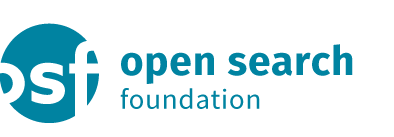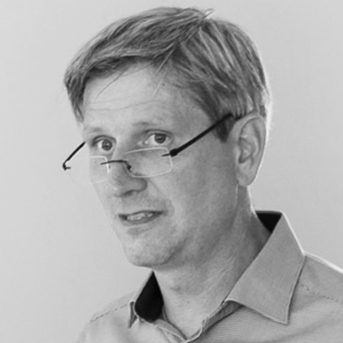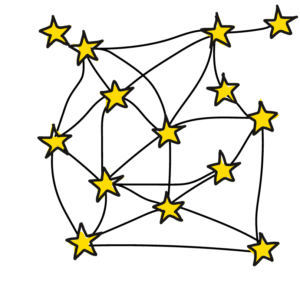„Democracy needs many different data models and web services.“
Interview with Dr Stefan Voigt. The geographer and scientist at the German Aerospace Center (DLR) is co-founder and CEO of the Open Search Foundation and member of the management team of openwebsearch.eu.
Interview: Susanne Vieser
Personal data in exchange for orientation on the web – this deal is usually behind web search and the use of web services. Stefan Voigt has a lot of objections to this. Voigt, who holds a doctorate in geography, has been studying the development of the internet for years and would like to see more competing offers and also more democracy there.
To make online search more transparent, he founded the Open Search Foundation with friends and colleagues and tested and implemented the first technical ideas for an open, transparent search. Since autumn 2022, Voigt has been on the management team of the European research project OpenWebSearch.EU: “Actually, it’s not just about technology, we have to get the European approach to internet technology into people’s heads and machines,” he says. – An interview on the “other” search and the confident use of the internet.
Why did you (co-)found the OSF?
Stefan Voigt: Out of concern about how we deal with the internet. Many colourful, practical web services come from Silicon Valley. When we use them, we usually don’t pay attention to the fact that our economic, social and informational sovereignty is extremely affected by it. We allow, out of convenience, more and more economic and social power to be concentrated on a few corporations on the internet, which then make the rules and violate our privacy through data collection. The most pressing example of this development is online search, the most widely used web service. If we provide a European answer to pressing questions and the foundation for more alternatives here with an openly accessible, freely usable index for information on the web, it will be a first step towards more transparency and democracy on the internet – the prerequisite for a better digital future.
How did you come up with the idea?
Stefan Voigt: As a scientist at the German Aerospace Center (DLR), I travelled a lot and often discussed the situation with researchers, interlocutors or colleagues … how we search for information online, don’t know why we are shown which clues and that we have to release a lot of data ourselves to do so. As an antidote, I came up with the idea of a web index that weights information according to criteria that can be viewed and that could be stored at many data centres instead of on a single server. I also found support for these ideas at DLR. The foundation of the association became concrete after a conversation with the director of the Social Entrepreneurship Academy in Munich. She advised me, firstly, to discuss and demonstrate the idea of an open web index with data centres and, secondly, to found an association. That way we could show our colours and win over like-minded people for the topic.
How and where did you find fellow campaigners?
Stefan Voigt: First of all, among family and friends, as well as among colleagues in science and work. After founding the association, we confronted scientific computing centres such as the Leibniz Computing Centre or CERN in Switzerland with the idea and mostly found open doors there. Many IT experts joined us. Then other institutions, companies, clubs and associations joined us, and with them even more interested people.
The OSF has been in existence since autumn 2018 – how far has the open index come? Can I already work with it?
Stefan Voigt: No, no one can work with the open web index yet, it exists in concepts and first parts so far. But we were able to place the topic with the European Union, which resulted in the OpenWebSearch.EU research project, which started in 2022. It brings together 14 project partners who will work and research on the planned index with 8.5 million euros in funding until 2025. So far, the first crawler experiments for indexing web information have been carried out, and the first search frontends can be expected in one or two years. But actually, it’s not just about technology, we have to get the European approach to the open and diverse internet into the heads and the machines – and we have come very far with this mission in the past years.
How has OpenWebSearch.EU changed your work and your life?
Stefan Voigt: Before, I was a volunteer for the Open Search Foundation, now I have reduced my working hours at DLR and am helping to coordinate the work on the web index with around 40 to 50 scientists and their working groups. We are now getting into the swing of things, which is a good experience for me.
Can an open web index be accelerated in the European network?
Stefan Voigt: Hopes are high, but there is no open index yet that works cooperatively on distributed resources. We are the first to develop and build such an index. This needs to go wider – which is why we will involve other research groups, companies, start-ups in OpenWebSearch.EU and divide up technical tasks.
Nevertheless, a look ahead: how will we search for information online in five years’ time?
Stefan Voigt: More diverse, with many more different search engines and more exciting front ends than today. For 20 years, we have been accustomed to very limited search services through Google and Co. This also shows how the concentration on a few players hinders the development of alternatives and thus progress. The transparent adaptation of search queries to individual needs, more convenient search masks with more choices, the clearer presentation of results – many things would be possible today, but were never realised. Only now is there movement again in online search with artificial intelligence, chatbots like ChatGPT and others or large language models.
What is driving you?
Stefan Voigt: The concern about the future, the economic and informational self-determination of individuals and Europe, but above all the question of how our children will and can use the digital space one day. We have learned in the meantime that democracy does not need exclusive platforms or a platform economy, but on the contrary: many different data models and web services. As a scientist, I also have the task of educating and I am burning for solutions that will take us forward.
Which entrepreneurs would you like to convince of open search and why?
Stefan Voigt: The many small and medium-sized enterprises that today allow themselves to be fleeced by internet corporations. I would like to open their eyes and show them what the consequences are when they allow themselves to be lured, out of convenience or because it’s cheap, to platforms and cloud services whose technology is not transparent and where they also pay with their data. We have nothing to hide’, I often hear. Of course we don’t. But with this attitude, they belong to the 90 percent of people who do not realise how lucrative personal data is today and that it can often be used against personal interests. Yet there are open source programmes, cloud or open data services that may take some getting used to at first, but are much more data-efficient, in some cases better and more sustainable.
Dr. Stefan Voigt
Co-founder and CEO of Open Search Foundation
Geographer and reaseracher at German Aerospace Center (DLR)


